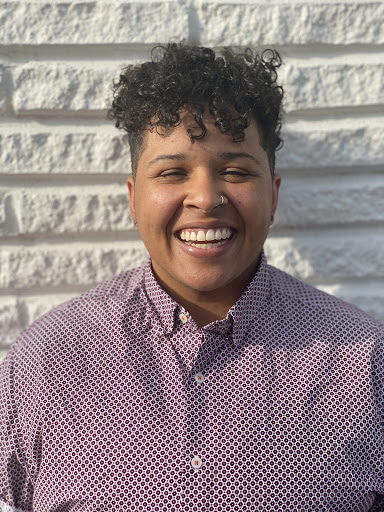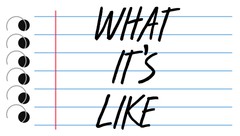A series in which people across the U.S. offer firsthand perspectives about how social issues impact their real lives.
Mia Geoly, 22, Denver, CO
All photos courtesy of their subjects.
Kalyn Livernois, 31, Carrboro, NC
I attend the University of North Carolina at Chapel Hill. The school's campus reopened earlier this month, when North Carolina's case count and death rate had far surpassed its numbers since students were initially sent home in the spring. Though some classes were offered remotely, residence halls, dining halls, libraries, and student stores were opened, as well. The reopening took place despite significant pushback from students, parents, faculty, and even the Health Department, who sent a letter asking UNC to go remote, which I fully expected to happen anyway at some point in this first semester out of necessity. In fact, this happened just two weeks after students started to return to the school: UNC–Chapel Hill closed for in-person learning yesterday just a week into classes after 130 students tested positive for COVID-19.The school's efforts to mitigate the spread of the virus included one-way traffic in buildings, testing for those with symptoms, removing access to shared computers, and contactless pickup of library materials. Carolina relied heavily on the expectation that students abide by "the three Ws" recommended by the North Carolina Department of Health and Human Services: Wear a mask. Wait six feet apart. Wash your hands. It didn't feel safe—and it wasn't.Last week, I went to campus to pick up a textbook rental. The bookstore was as crowded as I'd ever seen it. Nothing had been done to make it easier to navigate—it was nearly impossible to stay six feet away from people. By the time I got my book, I felt incredibly anxious to get out of the building and back to where I felt safe. "Safe," for me, is much more attainable than for those living on campus, which I didn't.The responsibility to keep our community as safe as possible should never have been put on the students. Tempting as it was to get upset with those who aren't doing what they should—and, believe me, there are times when I did—they aren't who should be faulted for the cases leading to the school having to close.UNC's actions and emphasis on student behavior deflect from the truth: The responsibility here is on the administration. It was before school closed, it is now, and it will be when our community continues to suffer because of the university’s decisions.Jaden Janak, 24, Austin, TX
I am a third-year graduate student with the Black Studies department at UT–Austin. During the COVID crisis, multiple family members of mine have died.UT–Austin is doing a mix of hybrid, virtual, and in-person learning. The administration is requesting (though not mandating) students quarantine for 14 days before coming to campus. There will be voluntary COVID tests and contract tracing. Face masks are only required indoors, except while in a "private office, eating in a campus dining facility, or when students are in their own residence hall rooms." Staff, faculty, and students are encouraged to do daily symptom checks on an app. In the midst of these so-called precautions, the athletic department is selling home season tickets for its major games, as well as to the Red River Rivalry game, which is played in Dallas.I will not be going back to UT–Austin in person. As a TA, I was placed into a lottery to determine what class I would work with. Thankfully, I was matched with an online class so I didn’t have to worry—but I made the decision not to go back even before knowing my schedule in consultation with my family and partner, regardless of how it would affect my employment status as a graduate student who works as a teaching assistant. Reporting for work in person would have been a threat to my safety and the safety of those I love. I've spent the past several months feeling very anxious and unsettled about potentially losing my employment, my status as a graduate student, and my life as a result of UT's policies.The university is allowing students to report UT community members through a Dean’s Office initiative surrounding COVID-19 guidelines. If found in violation of the mask-wearing policy, students, staff, and faculty are subject to disciplinary action, and repeated reports may lead to suspension from campus. The university would rather penalize its community members for not following its policies instead of creating public health–conscious policy by going completely virtual. As I worry when it comes to punitive policies about individual behavior, I think this will likely hurt Black, brown, and Indigenous folks most.Mina Richards, 23, New Orleans, LA
I'm in my third year of law school, and my school is doing a hybrid model, which people can opt out of in favor of solely remote learning. I have a very hard time learning online, so I had to make the difficult decision to come in person. However, I’m concerned because I am asthmatic. Currently, I do feel like my school is trying their best to take precautions, but nothing feels safe.I honestly think that we will be closed down by Labor Day. New Orleans is a hotbed for COVID-19, and students from all over the country are flooding in because there are nine four-year universities here, many of which are having in-person classes. We're such a tourism-heavy place, and people are starting to resume their normal travels here. I can’t see how COVID wouldn’t spread immediately.I’m really concerned about how students coming back to NOLA will impact the community around us. So far, the university is reporting low positive test rates from the testing of all returning students and professors. I’m just hoping for the best.Abby Henkel, 21, Haddon Township, NJ
Hamilton College is planning on reopening the campus for in-person enrollment, with the option to take some classes remotely. Hamilton requires its students to live on campus if you’re taking any in-person classes. Since remote classes were difficult at home with my family in the spring, it’s helpful to live at school, and I won’t have to worry about infecting my parents or my grandmothers when I run errands.The new safety regulations in place apply not only to academic spaces, but to almost every aspect of our lives here, as long as we're on campus. Residence halls are divided into different tiers. A "family unit” is the smallest and consists of six people max , then a “cohort” which includes 10-12 people, then an “extended family”—the largest group of students (all on the same floor of the same residence hall, maybe 30 people). We're allowed to socialize among this group as long as only 10 of us are together at a time. But if the virus begins to spread on campus, then we might have to minimize our social circles. I feel a bit mistrustful about not knowing whoThe administration has stressed that it doesn’t want to use campus safety to “police” student behavior, but that students can reach out to the school if they encounter problems regarding the new regulations. The college wrote, “Failure to comply with these requirements will result in an immediate evaluation to determine whether a student will be allowed to remain on campus.” They’ve established a “hearing procedure” and sanctions. I wonder what this "not-policing" will look like, considering the current discourse around policing and accountability.Residential Life staff have suggested that we only pack two suitcases and a tote, so that we are able to move out within 24 or 48 hours if the school closes there is a decision to close the campus—and I worry about the college’s plan to send students home if the virus breaks out, which might lead us to infect those we return home to.Fabiana Montoya, 22, Worcester, MA
Out of the five classes I have enrolled in at Worcester State, three of them are expected to function online with synchronous meeting times in person. For another class, I'll attend in-person lectures for at least five total days throughout the course. Another class will be completely in person two days a week.Just setting foot on campus defeats the purpose of being safe. I also don’t feel safe because of the indecision of campuses that announced they are going to open for in-person teaching, only to have our schedules slowly shrink to online methods. These are not confident moves for an institution that has reportedly been planning reopening strategies for months, but I guess the less I have to go on campus, the better.Maimuna Gassama, 23, Atlanta, GA
My school went 100 percent virtual about two weeks ago—after sending us various emails ensuring that we would, in fact, have the choice to opt into a hybrid system based on our comfort. Many of my classmates and I had already signed leases for housing near and made arrangements to move to our various campuses.My quality of learning significantly decreased when my school went 100 percent virtual at the start of the pandemic. Though I’m very sympathetic to the difficulties faced by professors and appreciative of their efforts to adapt, taking quantitative classes online, like economics and statistics courses, has been difficult. Last semester, I couldn’t decipher what was being drawn in graphs and tables; the professors’ whiteboards were too far from the camera to see, screens froze, and videos didn't play.With no employment prospects in sight, it’s like I’ve been backed into a corner. Do I take a year off and do nothing, or power through and pay an increased amount for an educational experience that will undoubtedly be lower in quality?At first, I was very set on the hybrid model, and though I still believe in-person classes are far superior, I think going totally virtual might be for the best. It seems like the situation is getting progressively worse. Being virtual would protect students, professors, and other staff that would otherwise be put at risk. That said, going ahead with a planned tuition increase seems very unfair. We deserve at least a five percent tuition reduction, or at the very least, not an increase. Students and professors have been asked to “adapt,” and I think our tuition should do the same.Follow Reina Sultan on Twitter.

